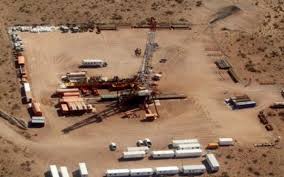Algeria is on the verge of finalizing two major agreements with American giants ExxonMobil and Chevron as part of an ambitious strategy to exploit its immense shale gas reserves. With 3,419 trillion cubic feet in place, including 707 trillion technically recoverable, the country holds the third largest reserve in the world behind China and Argentina, nearly four times its proven conventional reserves. This potential represents a strategic lever to diversify production, strengthen exports, and meet the growing demand of markets, particularly in Europe. According to Bloomberg, discussions are at an advanced stage and should lead to official signatures in the coming weeks.
In May 2024, Sonatrach and ExxonMobil signed a memorandum of understanding to explore and develop the Ahnet and Gourara basins, two key areas in southern Algeria rich in unconventional gas. In January 2025, Chevron, on the other hand, formalized a cooperation agreement with the National Agency for the Development of Hydrocarbons (ALNAFT) for offshore projects, the first step in a relationship expected to expand to onshore and shale. The current negotiations aim to move from the study phase to signing development contracts covering pilot projects and heavy investments.
Faced with increased competition from global producers and the need to maintain its strategic role as a gas supplier, Algiers has set a goal of increasing its annual production from 137 to 200 billion cubic meters in the medium term. Shale gas appears as an essential complement to offset the natural decline of certain conventional fields and secure deliveries to Europe, notably through the Transmed and Medgaz gas pipelines.
Since the reform of the hydrocarbons law in 2020, Algeria has strengthened its attractiveness to major international companies, which see in the country a rare combination of considerable geological potential, a strategic geographical position at the gates of Europe, and existing gas infrastructure facilitating exports.
However, shale gas extraction relies on hydraulic fracturing, a technique that is very water-intensive and controversial for its potential environmental impacts: pollution of groundwater, seismic risks, management of chemical effluents. In 2015, the In Salah pilot project triggered a large protest movement in the South, illustrating the sensitivity of the issue. The government will therefore have to ensure social acceptability and establish a strict framework for environmental protection.
In a context marked by global energy tensions and the search for alternatives to Russian gas, these agreements could strengthen Algeria’s position as a key supplier to Europe and increase its weight in international energy discussions. If the signing with Exxon and Chevron is confirmed, it will mark the country’s entry into the exclusive club of shale gas producers, with potentially massive economic benefits. However, the success of this strategy will depend on the authorities’ ability to balance economic imperatives, environmental constraints, and the support of local populations.


